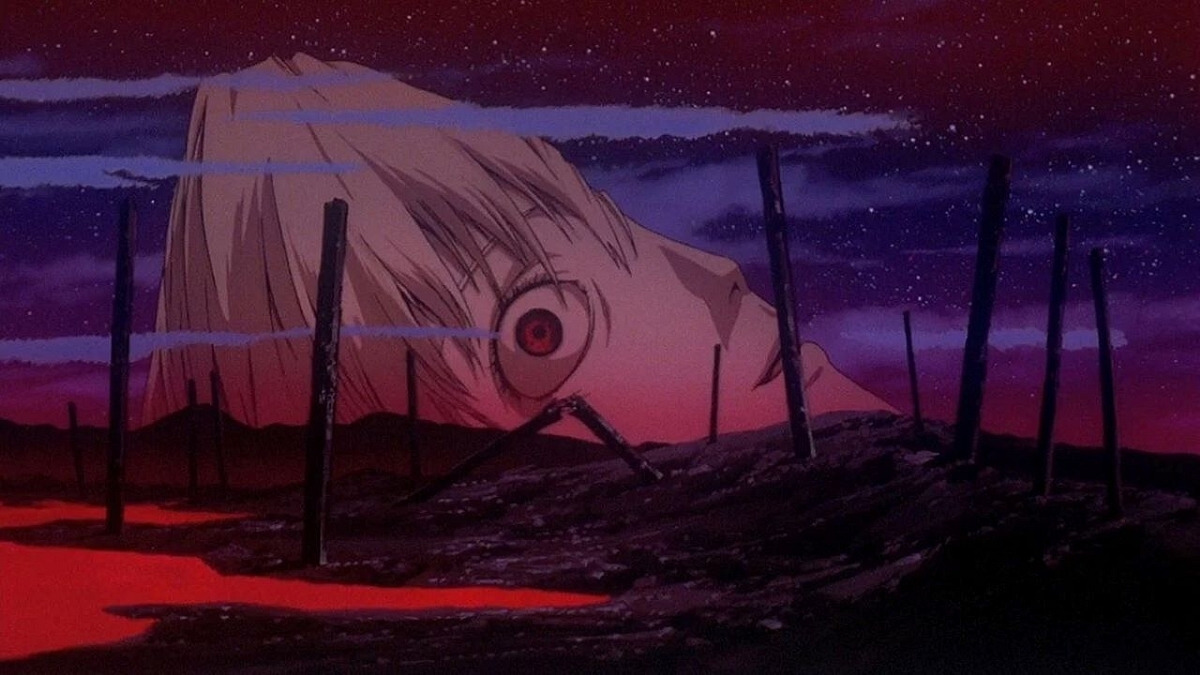NYC
How I Began To See Evangelion
by | Mar 30, 2024 12:51 pm
Post a Comment | E-mail the Author
Posted to: Film

Evangelion
IFC Center
West Village, Manhattan
3/29/24
(Spoilers. Etc.)
I am, with some small degree of vocality, no great fan of anime. I have a strong affinity for several of Miyazaki’s films, enjoy an episode of Cowboy Bebop occasionally, and think Akira is a fantastic piece of science fiction filmmaking. All the rest, the little else I’ve seen, I can largely do without. But Neon Genesis Evangelion holds a special, special place in my heart.
Maybe it’s the knowing and ironic style, operating with a basic disdain for it’s own genre. Maybe it’s the Christological symbolism and deep-fried psychoanalysis that underpins the narrative’s themes; maybe it’s the show’s hopeful rejection of apocalyptic nihilism. Maybe it’s that even through all the explosions, bloodshed, flat out ridiculous violence, and egregious sexuality the ultimate spectacle is one concerned with the state of the soul in relation to other souls.
Maybe the robots just look cool.
I don’t know, but goddamn, do I love Evangelion.
My little brother, who’s visiting New York for the first time this weekend, is an ardent anime fan — reading the Mangas, spouting plot points from various stories with an encyclopedic rigor, knowing names, and parsing the almost always turgid canons of these usually long-running, convoluted narratives. It was incredibly fortunate that during his first visit to the City, there happened to be screening in an actual movie theatre one of the genre’s true masterpieces, an earnest piece of animated cinema both of us had only ever seen on our laptop screens.
For the uninitiated, I’ll give a brief (very brief, given the actual scope of this franchise) rundown of why there’s even an End of Evangelion to begin with.
Story goes, best I know, that Hideaki Anno, the creator of the original series for which the movie is to serve as the capstone, ran out of money during the creation of Neon Genesis. Apocryphally, this led to him wrapping-up the series in a collage-adjacent, experimental fashion, eschewing the big ending battles and final showdowns for a heady illustration of protagonist Shinji’s dissolving and recombinant psyche, from ego-death to enlightenment.
This was taken none too well by show’s fans, who by this point had likely been fed up with Anno’s constant undercutting of expectations and experiments with form. (One of the key features of the Neon Genesis show is the lack of ‘epic-ness’ in the fights between the giant robots and invading monsters, Angels — often the fights end in a single blow or, increasingly, must be figured out strategically instead of solved with brute force; when they are violent, it nears slapstick, only the catastrophic aftermath holding any weight with the characters and thusly the audience.)
I cannot here go into all the details of the original plot; it’s complicated thematically and dull in the simplicity of its execution. In short: The earth is under attack from monstrous beings, three children must pilot giant robots to kill the monsters, nothing is as it seems — the monsters are proto-humans trying to come home, and the robots are the kids’ dead parents. If all the monsters are killed, the humans can attempt to unify as one soul, tearing down the boundaries that separate everyone’s heart from everyone else’s, thus entering paradise, thus ascending to heaven, etc. etc. etc.
It doesn’t make any fucking sense. It’s coolest shit I’ve ever seen.
End of Evangelion serves to replace the last two episodes of the original show, with the promise of all the spectacle and violence that we missed by being locked in Shinji’s mind. And, holy shit, does it deliver.
Again, though the thing is convoluted and borderline nonsense, it is executed so beautifully as to make a case for itself based on visuals alone: A giant spirit child ushers in the end times after subsuming a crucified mech, robots are torn to bits and bleed and scream like humans, the kabbalah is evoked, humans liquify as the walls of their hearts cease to hold together, a black moon rises out of the rubble — and that’s, like, a quarter of the sights to behold. The magic, the true honest power, of the thing is that in all this revelatory apocalypse the thing that’s actually of concern is the soul of a few children, their traumas, and how they move through them. The world burns and falls apart because we don’t love each other enough, and hardly know how to start trying harder. The thing ends with an incredibly powerful final argument: that the solution isn’t the elimination of our differences, it isn’t the unification into some hive or group-mind, or even to become God, but instead to learn what it is to be human, what it is for others to be human, and to value the closeness the walls of our heart still allow us — not to fret that we cannot be one with the objects of our desires, but instead to love the fact that there is desire in the first place.
Seeing this film with a family member, a sibling no less, added to its power. There I sat, bathed in light and sound, next to the man with whom I share the most of Life — history, blood, memories — and I know nothing of the inner-workings of his heart and mind in that moment. But we were together, under the same light and sound — together in difference, the same in space, one in understanding.